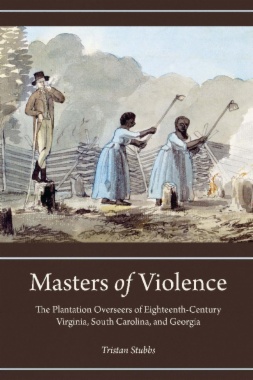From trusted to tainted, an examination of the shifting perceived reputation of overseers of enslaved people
In the antebellum southern United States, major landowners typically hired overseers to manage their plantations. In addition to cultivating crops, managing slaves, and dispensing punishment, overseers were expected to maximize profits through increased productivity—often achieved through violence and cruelty. In Masters of Violence, Tristan Stubbs offers the first book-length examination of the overseers—from recruitment and dismissal to their relationships with landowners and enslaved people, as well as their changing reputations, which devolved from reliable to untrustworthy and incompetent.
At the beginning of the eighteenth century, slave owners regarded overseers as reliable enforcers of authority; by the end of the century, particularly after the American Revolution, plantation owners viewed them as incompetent and morally degenerate, as well as a threat to their power. Through a careful reading of plantation records, diaries, contemporary newspaper articles, and many other sources, Stubbs uncovers the ideological shift responsible for tarnishing overseers' reputations.
In this book, Stubbs argues that this shift in opinion grew out of far-reaching ideological and structural transformations to slave societies in Virginia, South Carolina, and Georgia throughout the Revolutionary era. Seeking to portray slavery as positive and yet simultaneously distance themselves from it, plantation owners blamed overseers as incompetent managers and vilified them as violent brutalizers of enslaved people.
- Cover�������������������������������
- Masters of Violence�������������������������������������������������������������������������
- Title�������������������������������
- Copyright�������������������������������������������
- Dedication����������������������������������������������
- Contents����������������������������������������
- Acknowledgments�������������������������������������������������������������
- A Note on Terminology�������������������������������������������������������������������������������
- Introduction To “treat them . . . inhumanly”— Overseeing in the Eighteenth Century����������������������������������������������������������������������������������������������������������������������������������������������������������������������������������������������������������������������������������������������������������������������
- Chapter One A “continual exercise of our Patience and Economy” The Structure of Oversight, Patriarchism, and Dependence in Pre-Revolutionary Virginia, South Carolina, and Georgia
- Chapter Two “Douptfull of my Diligence” Overseer Recruitment and Character Requirements
- Chapter Three “Nothing pleases me better than to see them in good order” Contractual Relationships between Overseers and Planters
- Chapter Four “Under the shadow of my own Vine & my own Fig-tree” Relations between Overseers and Slave Owners
- Chapter Five “At their uttermost perils” Relations among Overseers, Bondpeople, and Servants
- Chapter Six “Insurgents . . . disappointed in their villainous Stratagems” Plantation Overseeing during the American Revolutionary War
- Epilogue “Little better . . . than human brutes”— The Consolidation of Anti-overseer Stereotypes����������������������������������������������������������������������������������������������������������������������������������������������������������������������������������������������������������������������������������������������������������������������������������������������������������������
- Notes�������������������������������
- Bibliography����������������������������������������������������
- Index�������������������������������

